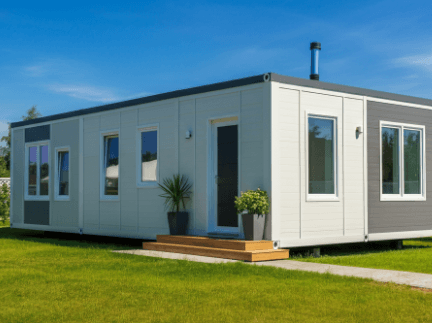How Much Is a Modular Home Installed on Florida Land? Installing a modular home on Florida land typically ranges between $100,000 and $350,000, depending on location, customization, and land preparation needs. The question on many homebuyers’ minds: “How Much Is a Modular Home Installed on Florida Land?” Considering the increasing interest in modular homes due to their affordability, customizability, and efficiency, it’s no surprise that potential homeowners are curious about the investment required. This post will provide comprehensive insights into the cost of installing a modular home on Florida land, breaking down the factors influencing the final price. Whether you’re contemplating the purchase of your first home or looking to invest in property, understanding “How Much Is a Modular Home Installed” in the context of Florida’s unique real estate landscape is essential. Join us as we unpack everything you need to know to make an informed decision.
Steve Daria and Joleigh, seasoned real estate investors keen on modular homes, have navigated the complexities of Florida’s real estate market. They emphasize that the cost of installing a modular home in Florida varies widely based on location, customizations, and current real estate trends. Their experience highlights the importance of considering all possible expenses to budget effectively for a modular home installation.
The Appeal of Modular Homes
Before discussing “How much is a modular home installed?” it’s essential to understand that the appeal of modular homes lies in their modern construction methods, which prioritize efficiency and sustainability.
Modular home manufacturers can minimize waste and ensure consistent quality standards by building modules in a controlled factory environment.
This approach also allows for faster construction times since weather delays and onsite disruptions are minimized.

As a result, homeowners can move into their new modular homes more quickly than traditional stick-built construction.
How Much Is a Modular Home Installed on Florida Land?
Understanding the costs involved in installing a modular home in Florida requires a comprehensive assessment of various factors beyond just the price of the house module.
Land costs play a significant role, as the location and size of the property can notably impact the overall budget.
Additionally, site preparation expenses must be considered, including clearing the land, leveling the site, and addressing drainage or soil stabilization requirements.
These preparatory tasks ensure a suitable foundation for the modular home and may vary depending on the condition of the land and local building codes.
How much is a modular home installed on Florida land? Here is the breakdown:
Land Costs
Your modular home needs a place to sit, and land prices vary widely depending on location in Florida.
Whether you’re eyeing a plot near the beaches of the Gulf Coast or in the more rural parts of Central Florida, securing land is your first step.
Site Preparation
The site needs to be prepared before your modular home can be installed.
This includes clearing and leveling the land and ensuring it’s ready for the home’s foundation.
Costs can fluctuate based on the land’s initial condition and the required work.
Foundation Construction
The foundation is a critical component of your modular home installation.
Options include slab, crawl space, or basement foundations, each with varying costs.
In Florida, slab foundations are standard due to the state’s high water table, but choices vary based on personal preference and site conditions.
Get Started: Get Your Cash Offer Below…
We are direct land buyers. There are no commissions or fees and no obligation whatsoever. Start below by sharing where your property is and where we can send your offer…
Assembly and Set-Up
Once the modules arrive at your site, they need to be assembled.
This process involves renting a crane to place the modules, professional assembly, and ensuring everything is adequately joined and sealed.
Labor costs in Florida can affect this part of your budget.
Utility Connections
Connecting your modular home to electricity, water, sewage, and possibly gas is a requirement.
The cost here depends on the proximity of your site to these services.
Rural locations face higher costs due to the distance utilities need to be extended.
Additional Elements
Consider the cost of any additional site-built elements you plan to include.
Garages, decks, and landscaping are popular but add to the budget.
Financing Your Modular Home
Financing a modular home in Florida is similar to funding a traditional house.
Most lenders treat modular homes like site-built homes, offering a range of mortgage options.
It’s essential to shop around and find a lender familiar with modular homes and their unique construction process.
Permitting and Regulations
Florida has specific zoning laws and building codes that apply to modular homes. Delving into these regulations is crucial for a smooth installation process.
Ensure you or your builder obtain all necessary permits before beginning construction. Comply to avoid delays and increased costs.
Tips for Keeping Costs in Check
Maintaining a budget while constructing a modular home in Florida can be challenging yet rewarding.
This section will share essential strategies to ensure your project stays financially manageable without compromising quality.
Choose Your Location Wisely
Research land prices and availability in different parts of Florida to find a balance between location and affordability.
Plan Your Design
Modular homes offer design flexibility. You can optimize your layout to meet your needs without excessive customization, which can drive up costs.

Get Multiple Quotes
For the modular home, site preparation, or additional construction, getting multiple quotes can help ensure you get fair prices.
Consider the Long Term
Investing in energy-efficient modules can increase initial costs but save money in the long run through lower utility bills, especially in Florida’s climate.
Frequently Asked Questions
Below, we explore some of the most frequently asked questions about the cost and installation process of modular homes in Florida.
Can I Build a Modular Home Anywhere in Florida?
Most areas in Florida allow modular homes, but local zoning laws and homeowners’ association rules may have specific requirements or restrictions.
How Long Does It Take to Install a Modular Home?
The process can take several months from order to move in.
Much depends on the complexity of the home, site preparation needs, and permit approval times.
Are Modular Homes as Durable as Traditional Homes?
Yes, modular homes are made to the same building codes as traditional homes and are often even more vital due to the need to withstand transport to the site.
Is a Modular Home a Good Investment?
Investing in a modular home can be a sound financial decision, particularly when considering appreciation potential and cost savings.
Modular homes are made to the same building codes and standards as traditional stick-built homes, ensuring structural integrity and quality construction.
As a result, modular homes have the potential to appreciate over time, mainly if located in desirable neighborhoods or regions experiencing economic growth.
Conclusion
Installing a modular home in Florida presents an exciting opportunity for sustainable living. It offers a customizable, efficient, and potentially more affordable path to homeownership. You can make reasonable decisions throughout the process by understanding the various components that affect your budget and following strategic tips to know how much is a modular installed. Modular homes provide a unique way to achieve your dream home and contribute to a greener, more sustainable future in the housing industry.
**NOTICE: Please note that the content presented in this post is intended solely for informational and educational purposes. It should not be construed as legal or financial advice or relied upon as a replacement for consultation with a qualified attorney or CPA. For specific guidance on legal or financial matters, readers are encouraged to seek professional assistance from an attorney, CPA, or other appropriate professional regarding the subject matter.
